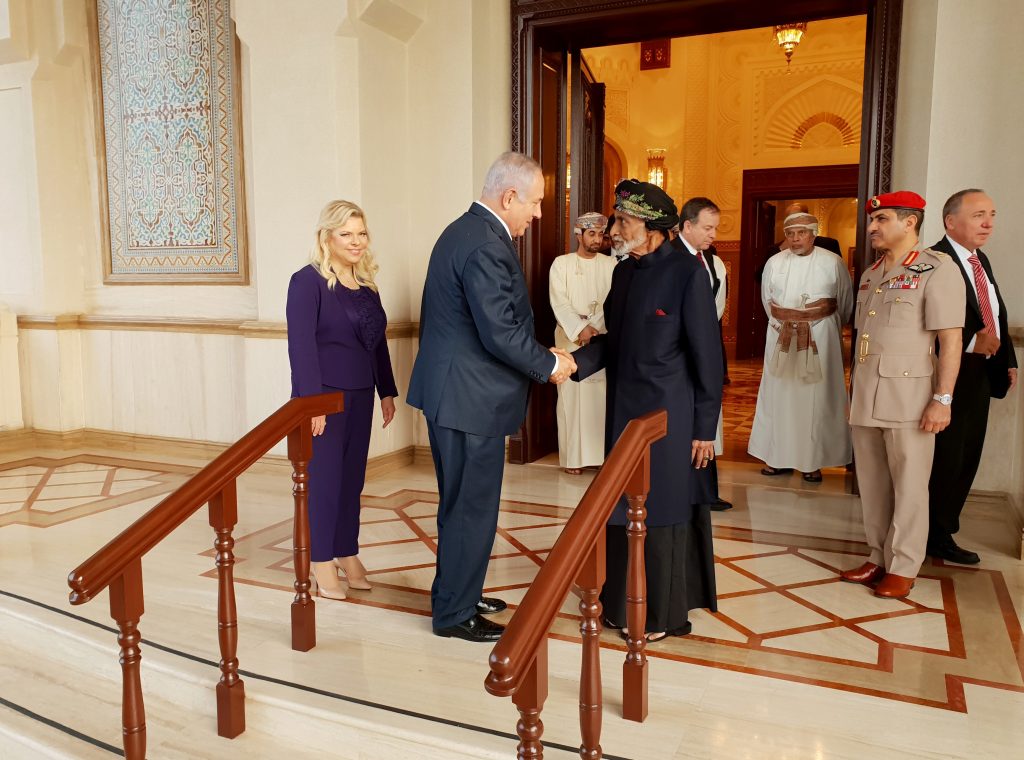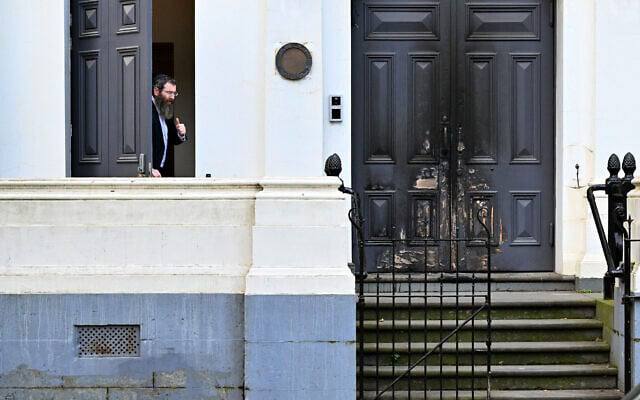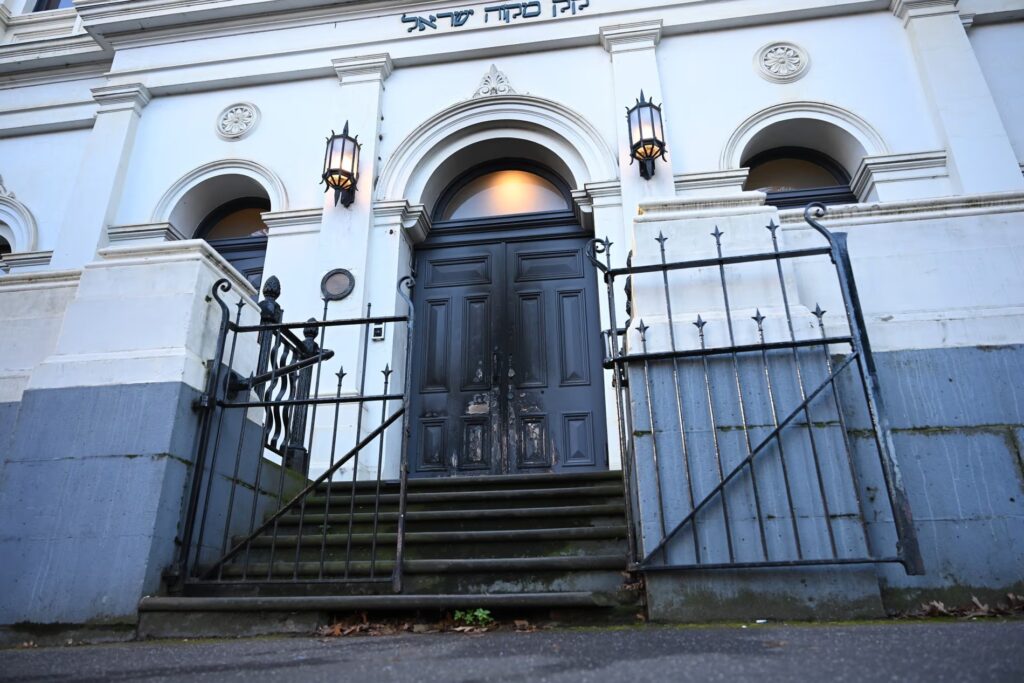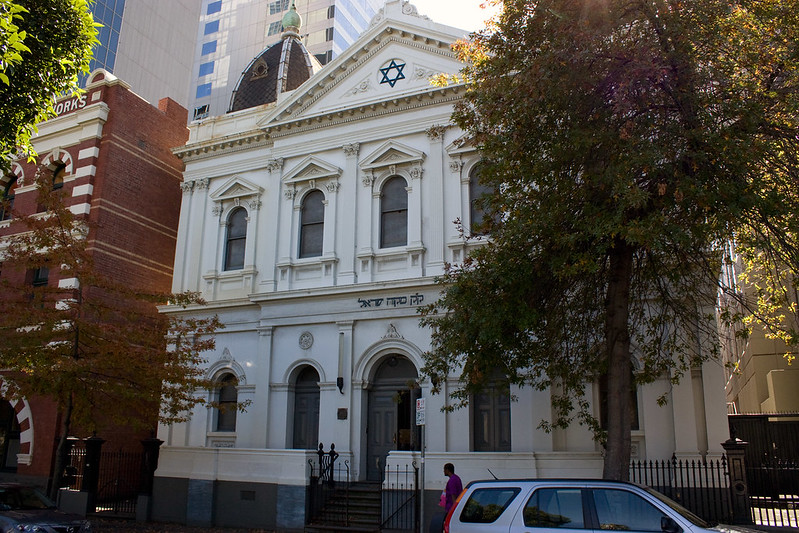UPDATES
Bottom-up peace hopes?/ Netanyahu in Oman
November 2, 2018 | AIJAC staff

Update 11/18 #01
Today’s Update features two pieces suggesting there may be hopes for a different model of moving toward a two-state Israeli-Palestinian peace, one relying on the growing apparent willingness of Palestinian to engage with Israel and Israelis, especially economically. It also includes an analysis of the significance of Israeli PM Binyamin Netanyahu’s surprise visit to Oman last Friday. (That visit was followed up with some very positive calls from Oman for Israel’s acceptance as a part of the region.)
First up are some thoughts on peacemaking from veteran American journalist and thinktank head Cliff May, following a visit to Israel. May suggests that, while the Trump Administration’s “deal of the century” peace proposal is unlikely to be accepted by the Palestinians, the Administration’s wider policies toward the Palestinians may be helping prepare the ground for progress in other respects. Specifically, May argues that Trump Administration measures such as withdrawing funds from UNRWA, and taking action to recognising Jerusalem as Israel’s capital are undoing some Obama Administration mistakes, and changing the calculations of West Bank Palestinians in a way likely to encourage them to accept more normalisation and cooperation with Israelis. For his complete argument as to why this may be the road to peace, CLICK HERE.
Next up is Washington Institute for Near East Policy expert David Pollock discussing the most recent polls of Gazans. Pollack notes that, despite Hamas radical rule in Gaza, these polls show that a majority of Gazans are opposed to the violent protests along the Gaza borders, and most would like a truce with Israel. Moreover, in line with May’s thesis, Pollack notes majority Gazan willingness to coexist with Israel, a keen interest in economic ties with Israel, especially jobs, and a desire for US aid. For this interesting data from Gaza and Pollack’s savvy analysis of it, CLICK HERE.
Finally, Israel Kasnet of JNS.org quotes some expert analysts on the significance of the Netanyahu Oman visit last Friday. The experts he consults suggest that the visit to Oman – surprising more because it was public than because it took place – and the growing Israeli relationship with Oman, is about more than increasing Israeli ties with states of the Persian Gulf, which seek Israeli assistance in countering the strategic challenge of Iran. In addition, they reflect the hope of many emerging states that Israeli expertise and entrepreneurship can help them deal with serious economic problems and speed future development. For all the details, CLICK HERE.
Readers may also be interested in…
-
- More good Israeli comment on the Oman visit from Ronen Bergman and Udi Segal.
- Reports that Israel has reached a tacit agreement with Hamas to temporarily lower the levels of violence around Gaza, amidst a struggle inside Hamas between the political leadership, which wants a truce with Israel, and the military leadership, which wants to keep up violent protests, incendiary kites and others forms of conflict with Israel. Meanwhile, Iran, patron of both Hamas and the more radical Palestinian Islamic Jihad inside Gaza, has reportedly been pushing for violence to escalate.
- An interesting report about the realities of Gaza from Laura Kelly, a journalist who recently visited the strip.
- Israel reportedly has been offering economic incentives to PA President Mahmoud Abbas for renewed ties between Ramllah and Jerusalem, but Abbas has not been interested.
- Isi Leibler on Israel’s need to restore its deterrence in Gaza.
- Some examples from the many stories and comments now appearing at AIJAC’s daily “Fresh AIR” blog:
- AIJAC’s Colin Rubenstein on the Australian government’s decision to review our policy on Iran in today’s Daily Telegraph.
- Visiting Israeli strategic expert Brig. (res) Yossi Kuperwasser on ABC-TV 24 on Wednesday, speaking about Jerusalem and the peace process. Earlier, Kuperwasser spoke to David Speers of Sky-TV about Jerusalem, the peace process, Iran and Saudi Arabia. Plus, here is an excerpt of a lecture he gave, talking about the Iranian population’s desire for pragmatic change.
- Video of leading counter-terrorism expert Dr. Boaz Ganor, currently visiting Australia, speaking about “lone-wolf” terrorism. Plus, a longer lecture by Ganor on counter-terrorism at the Sydney Institute can be seen tomorrow on Sky News Extra, Channel 604 on FOXTEL, at 9.30am, 3.30pm & 8.20pm.
- AIJAC’s Jeremy Jones speaking with Sky News Australia about the massacre of worshippers at the Tree of Life synagogue in Pittsburgh last Saturday and the ongoing threat of violent antisemitism.
Peace processing 2.0
Trump’s progress on the Palestinian-Israeli file
Clifford D. May
The Washington Times, October 31, 2018 |
JERUSALEM, ISRAEL — Tibetans would like a state of their own, as would Uyghurs. China’s rulers do not intend to let those peoples go. The Kurds would like a state of their own. The governments of Turkey, Iran, Iraq, and Syria remain determined to prevent them from establishing one. The Chechens would like a state of their own. Russian President Vladimir Putin will allow that when pigs fly.
Most famously, of course, the Palestinians would like a state of their own. They could have one. They’ve been offered one — on several occasions. But, in exchange, they’d have to agree to end their conflict with Israel, negotiate borders and security issues, and embrace peaceful coexistence with their Jewish neighbors.
Hamas, which rules Gaza, has said clearly that it will never pay that price. Palestinian Authority Chairman Mahmoud Abbas, who governs the West Bank, claims to favor a two-state solution. But he has never been willing to accept the three concessions listed above.
Nor has he ever seriously attempted to prepare Palestinians for peace. Were he to sign a peace treaty, it is doubtful Palestinians would accept it, or that he would be able to implement it.
Given this context, you might conclude that President Trump stands no chance of making progress on the Palestinian-Israeli file. A visit to Israel leaves me with a different impression. I think it’s possible for him to create new and improved facts on the ground. Actually, he already has.
In December 2016, during his final days in office, President Obama facilitated the passage of UN Security Council Resolution 2334, which declared the West Bank, including east Jerusalem, “Palestinian Territory.”
 The Obama Administration’s facilitation of UN Security Council Resolution 2334 in Dec. 2016 sent the Palestinian a problematic message.
The Obama Administration’s facilitation of UN Security Council Resolution 2334 in Dec. 2016 sent the Palestinian a problematic message.
Within east Jerusalem lies the Jewish Quarter of the Old City and the holiest Jewish religious sites — places where Jews lived and worshipped for thousands of year before being exiled by Jordanian soldiers in 1949. Jews returned only in 1967, after Israeli troops, fighting a defensive war, drove out the occupying Jordanian forces.
UNSCR 2334 sent Palestinians a message: that the ethnic and religious “cleansing” of the Jews was not wrong, and that the Hamas narrative is right. Because if Jews don’t belong even in the Jewish Quarter, they don’t belong anywhere in the region; they have no history or homeland here; and they are not a people.
From that, the de-legitimization of Israel and the dehumanization of Israelis ineluctably follow. That’s not the precondition for a two-state solution. It is the precondition for a final solution.
The resolution also said to Palestinians: No need to negotiate or compromise. Appeal instead to the “international community” which will demand much of Israelis and nothing of you.
I’m willing to believe that Mr. Obama intended none of that. The fact, however, is that UNSCR 2334 placed an enormous obstacle in the path of any peace process undertaken thereafter.
Repealing a Security Council resolution is virtually impossible, but President Trump did the next best thing: He moved the U.S. embassy to Jerusalem, thereby reaffirming and reemphasizing America’s support for the legitimacy of Israel and for Jerusalem as its capital.
That doesn’t rule out the possibility of Palestinians also having a capital in Jerusalem or immediately adjacent to it. But such an outcome would have to be the result of negotiations between Palestinians and Israelis.
As they say in the television ads: “Wait! There’s more!” President Trump last month ordered the closing of the Palestine Liberation Organization office in Washington, the de facto Palestinian embassy. The PLO “has not taken steps to advance the start of direct and meaningful negotiations with Israel,” the U.S. State Department explained, adding that Palestinian leaders also have “condemned a U.S. peace plan they have not yet seen and refused to engage with the U.S. government with respect to peace efforts and otherwise.”
Also helpful: In late August, President Trump’s slashed funds to the UN Relief and Works Agency which provides services to Palestinian refugees – as well as their millions of descendants whom UNRWA also designates as refugees.
 Jerusalem Mayor Nir Barkat’s efforts to replace UNRWA services to Palestinians with municipal services in eastern Jerusalem could help foster a new kind of peace process.
Jerusalem Mayor Nir Barkat’s efforts to replace UNRWA services to Palestinians with municipal services in eastern Jerusalem could help foster a new kind of peace process.
Soon after, Jerusalem Mayor Nir Barkat recently announced that he was replacing UNRWA in east Jerusalem’s Shuafat refugee camp. Charging that the agency has “failed utterly” to provide adequate sanitation, health care, education and welfare, and that it not just tolerates but incites terrorism, Mr. Barkat committed the municipal government to assuming responsibility for Shuafat’s 30,000 residents who, he said, should be treated “like any other residents” of the capital.
If this initiative succeeds, it could constitute a kind of peace process – albeit one carried out by people in the streets rather than diplomats in drawing rooms. Over time, it could shift the calculus of Palestinians in the West Bank, and perhaps even those in Gaza.
Imagine what it would mean if the next generation of Palestinian leaders did not oppose “normalizing” relations with Israelis. Imagine if jihadist terrorists were no longer glorified as martyrs in Palestinian mosques and media. Imagine if Palestinians willing to work with Israelis for the benefit of both peoples were no longer condemned as apostates and traitors.
I don’t expect any of that to come to pass while President Trump is in the White House. But he has fixed what his predecessor had broken. And he’s made clear that Palestinians can have a state of their own, but only if they recognize that a two-state solution implies two states for two peoples, both willing to peacefully co-exist. That may not amount to the “deal of the century,” but it’s more than any past peace process achieved.
New Polls Show Most Gazans Want Israeli Jobs, Not Hamas Mobs
David Pollock
Fikra Forum, October 29, 2018
 A majority of Gazans do not support the Hamas-led border clashes, and would prefer a truce and jobs in Israel.
A majority of Gazans do not support the Hamas-led border clashes, and would prefer a truce and jobs in Israel.
Over the past weekend, the Hamas rulers of Gaza took one old and two new steps. They launched more incendiary balloons at Israeli villages; they condemned Israeli Prime Minister Netanyahu’s official visit to Sultan Qaboos in Oman; and they equated the Pittsburgh synagogue massacre to the “terror” of “Israeli occupation.” Behind these headlines, however, the reality on the ground among ordinary Palestinians in Gaza looks very different.
The proof for this assertion lies in two new, reliable Palestinian opinion polls taken inside Gaza this month. The data demonstrate that the majority of its people actually oppose the violent Hamas border protests — and at least half would even support a formal cease-fire with Israel. Based on these and related findings outlined below, U.S. policymakers would be well advised to take two steps of their own. First, understand that Hamas has only minority support in Gaza, so it will likely fail in launching mass popular action against Israel. Second, pursue an approach that promises practical economic and humanitarian help to the people of Gaza, not to their Hamas overlords.
Equally surprising, especially compared to the usual media narrative, most Gazans say they want direct personal dialogue with Israelis. Most would like Israeli companies to provide jobs for them inside their Hamas-ruled territory. Most also blame Hamas, the Palestinian Authority in Ramallah, the UN, or Egypt – rather than Israel — for their economic woes. Moreover, remarkably, a plurality of Palestinians in Gaza say they want Hamas to change its rejectionist position and agree to make peace with Israel.
More specifically, regarding the weekly Hamas-led border protests, just 36 percent of Gazans support this tactic, while 62 percent say they oppose it. Conversely, a formal cease-fire with Israel garners more support than opposition: 73 to 25 percent in one poll; 51 to 45 percent in the other. On the harder question of full peace with Israel, notably, both polls likewise show more popular support than opposition. The question wording is crystal clear: should Hamas “stop calling for Israel’s destruction, and instead accept a permanent two-state solution based on the 1967 borders”? One poll shows Gazans say yes by a margin of 53 to 45 percent; the other poll yields a slightly narrower margin, 48 to 44 percent.
Regarding contacts with Israel, even without a peace agreement, the evidence is yet clearer. Despite the official anti-normalization policies and demonization propaganda of their Hamas rulers, both polls show that two-thirds of Gazans want “direct personal contacts and dialogue with Israelis.” An even higher proportion, three-quarters, also say they “would like to see Israeli companies offer more jobs inside the West Bank and Gaza.”
Even more striking is how few Gazans primarily blame Israel for their current dire economic straits. Asked who is most responsible for the slow pace of reconstruction in their area, the majority pick either Hamas (32 percent) or the Palestinian Authority (22 percent) – compared with just 27 percent who single out Israel. The UN and “no opinion” each get 8 percent of the vote for most at fault. Surprisingly, Egypt is last on this list of perceived villains, with a mere 3 percent.
To be sure, none of this means that most Gazans like, trust, or simply accept the lasting reality of Israel. In both polls, for instance, only about half say that negotiations with Israel have had even “somewhat positive” results to date. Similarly, only about half say that a two-state solution should “end the conflict.” And slightly more than half, 55 percent, still anticipate that “eventually, the Palestinians will control almost all of Palestine” – either because “God is on their side,” or because “they will outnumber the Jews some day.”
Nevertheless, on some final status issues too, Gazans are unexpectedly realistic. On the refugee problem, to cite but one highly emotive example, 68 percent favor accepting a “right of return” only to the West Bank and Gaza but not to Israel, “if that is the very last step required to end the occupation and achieve a real independent Palestinian state.” Among West Bankers, the comparable figure is a full 20 points lower. And the official position of both the Palestinian Authority and Hamas remains steadfastly opposed to such a compromise.
Finally, turning toward views of U.S. policy, Gazans exhibit a comparatively moderate mix of attitudes on that as well. Asked to select from a list “the one thing you’d most like the U.S. to do about the Palestinian issue these days,” the winner is “put pressure on Israel to make concessions,” with 38 percent. But a close second place goes to “increase economic aid to the Palestinians,” at 23 percent, followed by “put pressure on the PA and Hamas to be more democratic and less corrupt, at 14 percent. Only 16 percent say the U.S. should “stay out of Palestinian and Middle East affairs altogether.” On the West Bank, however, that option actually earns top billing, with a stunning 49 percent.
These unexpectedly moderate findings are based on two face-to-face, standard probability surveys taken by two different, reliable Palestinian pollsters among representative samples of approximately 500 randomly selected Gazans, during the period October 3-15. One poll was supervised by the highly experienced, Bethlehem-based Palestine Center for Public Opinion. The other, a condensed version with selected key questions, was run by a different but equally qualified, Ramallah-based organization. To optimize access and validity, both organizations used local Gazan interviewers and field supervisors exclusively.
Adding to their credibility, the data sets from these two polls are broadly similar (though with some differences noted above, almost certainly because the questions in one survey followed a long list of other provocative topics). Also, to ensure maximum reliability, I traveled to the region during the fieldwork to consult in person with the pollsters and interviewers, help edit and translate the questionnaires into Arabic, confirm their technical proficiency and quality controls, and iron out any practical problems — of which there were mercifully few. In addition, the relatively hardline results from some long-term questions argue convincingly that the tactical moderation expressed on short-term one is not simply a pretense or an artefact of “courtesy bias.” Indeed, it is precisely these mixed-to-negative views about Israel’s distant future that offer greater credence to the relatively pragmatic voices on more immediate issues.
Altogether, then, popular attitudes in Gaza reflect a different reality than either the militant image propagated by Hamas, or the desperate anger at Israel often portrayed in outside accounts. The findings from these new polls offer a compelling corrective to those stereotypes. So pundits and policymakers on all sides would be wise to pay much more attention to how the people of Gaza themselves see their admittedly very difficult situation, and to the realistic options they prefer for some improvements in their plight.
David Pollock is the Bernstein Fellow at The Washington Institute, focusing on regional political dynamics and related issues.
Like many emerging countries, Oman sees Israel as a partner in economic development
Oman began establishing preliminary ties with Israel following the Oslo peace process in the mid-1990s, which ended up being frozen during the Second Intifada. But now it needs Israeli help on the economic crisis there, which is worsening each year.
BY ISRAEL KASNETT
JNS.org, Nov. 1, 2018
 Israeli Prime Minister Netanyahu meeting with Oman’s Sultan Qaboos bin Said. Credit: Benjamin Netanyahu via Twitter.(November 1, 2018 / JNS)
Israeli Prime Minister Netanyahu meeting with Oman’s Sultan Qaboos bin Said. Credit: Benjamin Netanyahu via Twitter.(November 1, 2018 / JNS)
The Israeli national anthem playing at the Abu Dhabi judo competition on Sunday may have been music to the ears, but it was part of a larger symphony in the Middle East, with Israel playing first fiddle.
Times appear to be changing. After his country permitted Air India to use its airspace for direct flights to Israel earlier this year, Saudi Crown Prince Mohammed bin Salman recognized Israel’s right to exist and discussed future ties with the Jewish state in an interview with The Atlantic’s Jeffrey Goldberg. This week, an Israeli delegation traveled to the Muslim central African nation of Chad for talks on the possibility of renewing diplomatic ties between the two countries. Next week, Israel’s minister of transportation will travel to Oman for a conference on regional transportation, following a one-day visit by Israeli Prime Minister Benjamin Netanyahu.
And there are plenty more examples.
Are Israel’s relations with the Arab world improving? Judging by recent events in the diplomatic world, it certainly would seem so. And that’s what makes Netanyahu’s visit last week to Oman at Sultan Qaboos bin Said al Said’s invitation so significant.
Uzi Rabi, director of the Moshe Dayan Center for Middle Eastern and African Studies at Tel-Aviv University, told JNS, “The visit [of Netanyahu to Oman] in itself is significant, having been so public. Moreover, adding Oman to the block of moderate states is valuable, on top of the great benefits that Oman brings that has to do with agriculture, human capital and industry.”
‘The focus is on Gulf interests’
Shaul Yanai, an expert at Hebrew University’s Middle Eastern Studies Department, told JNS that he is not sure the visit will change anything in the near future, though it “reflects that in the Persian Gulf, Israel is no longer an outcast.”
“Oman is an independent state in the Persian Gulf,” said Yanai, author of The Political Transformation of Gulf Tribal States. “It has a good relationship with both sides—Iran and the Saudi coalition. The sultan didn’t ask anyone if he can invite Netanyahu to his country.”
Like other countries in the Arab world, Oman began establishing preliminary ties with Israel following the Oslo peace process in the mid-1990s. Former Israeli Prime Minister Yitzhak Rabin visited with at Sultan Qaboos bin Said al Said in 1994, and his successor, Shimon Peres, visited again in 1996, where they established a trade office. However, relations were frozen following the outbreak of the Second Intifada in 2000.
Yanai pointed out that the visit to Oman is more important than the actual relationship, which existed already. So why did Oman decide now to host Netanyahu openly? The reason, he said, is that it needs Israeli help on the economic crisis there, which is worsening each year.
“In the Persian Gulf, the broad understanding among countries in the last few years is that they must look after their own needs without the broader connection of the Arab-Israeli conflict,” explained Yanai. “The focus is on Gulf interests and, of course, the doors that Israel can open for them in the U.S. and other Western countries. Netanyahu’s relationship with the current administration in Washington is very valuable to them. Oman, especially, needs the help now more than ever.”
He added that the Gulf states are frustrated by the Palestinians because these countries have much more pressing needs, such as economic problems and strategic issues, than the Israeli-Palestinian conflict.
Yanai emphasized that Arab states are saying that the peace process needs to move forward. However, they are also signaling to the Palestinians that they will no longer reject a relationship with Israel that could be greatly beneficial.
“The hope,” he said, “is that Israeli military strength and a strategic relationship with the U.S. will hold back Iranian aggression a few more years, and maybe something will change in Iran.”
He believes it might be possible that Israel can play a larger role in Gulf politics, “mainly as one more front against Iran.”
Tags: Gulf states, Israel, Palestinians





